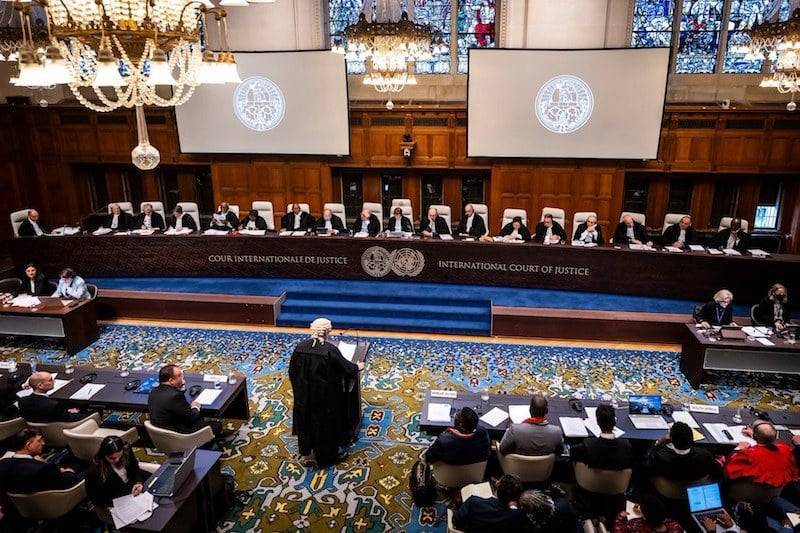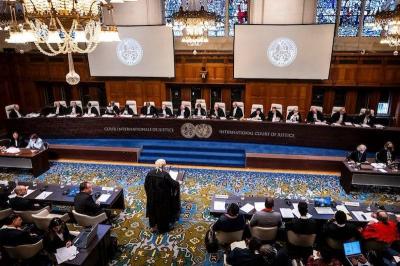Judges at the International Court of Justice today, Friday, are set to issue their decision on a request from South Africa for urgent measures against Israel, which Pretoria accuses of committing genocide due to its military operations in the Gaza Strip.
**What is the International Court of Justice?**
The International Court of Justice, also known as the World Court, is the highest legal body under the United Nations, established in 1945 to resolve disputes between states. It should not be confused with the International Criminal Court, which is also based in The Hague and deals with war crimes against individuals. The court consists of 15 judges—an additional judge from each party in the Israel case will be added—dealing with border disputes and increasing cases brought by states accusing others of violating United Nations treaty obligations. Both South Africa and Israel are signatories to the 1948 Genocide Convention, which grants the International Court of Justice jurisdiction to settle disputes based on this convention. While the case concerns the occupied Palestinian territories, the Palestinians have no formal role in the proceedings as they are not a member state of the United Nations. The Genocide Convention obliges all signatory nations not only to refrain from committing genocide but also to prevent and punish it. The treaty defines genocide as "acts committed with intent to destroy, in whole or in part, a national, ethnic, racial, or religious group."
**What is South Africa’s Case?**
In an 84-page filing, South Africa alleges that Israel’s killing of Palestinians in Gaza, inflicting severe psychological and physical harm, and creating living conditions aimed at "physically destroying" them constitutes genocide. The lawsuit claims that Israel is failing to provide food, water, medicine, fuel, and humanitarian aid to the population of Gaza during the ongoing war with the Palestinian Islamist resistance movement, Hamas. It also notes the ongoing bombing campaign that has destroyed a significant portion of the Gaza Strip and forced around 1.9 million Palestinians to flee, resulting in more than 25,000 deaths according to Gaza health officials. The lawsuit states that "all these acts are attributed to Israel, which has failed to prevent genocide and commits it in violation of the Genocide Convention," adding that Israel has neglected to prevent its officials from inciting genocide, contrary to what the convention stipulates. The lawsuit requests the International Court of Justice to impose emergency measures to halt the alleged violations committed by Israel.
The court is expected to issue its ruling at 1:00 PM (1200 GMT) in a session anticipated to last about an hour.
**What is Israel's Response?**
Israeli President Isaac Herzog described the accusation at the International Court of Justice as "ugly and illogical." Israel stated that it is doing its utmost to avoid civilian casualties in Gaza. The Israeli offensive was in response to an attack by Hamas fighters on October 7, which resulted in the deaths of 1,200 Israelis and the capture of 240 hostages, according to Israeli statistics. Herzog stated, "We will be at the International Court of Justice and will proudly present our case based on our right to self-defense under international humanitarian law." U.S. Secretary of State Antony Blinken spoke on Thursday with South Africa's Foreign Minister Naledi Pandor regarding the war in Gaza. The U.S. State Department stated that Blinken reaffirmed support for Israel's right "to ensure that the terrorist attacks of October 7 do not happen again."
**Court Sessions?**
The initial sessions were held on January 11 and 12. Africa and Israel presented their arguments for and against the urgent measures. No witnesses were summoned to testify or be cross-examined. South Africa’s request for the court to indicate temporary measures to protect Palestinians in Gaza is a preliminary step in a case that will take several years to complete. The purpose of the temporary measures is a type of restraining order to prevent the escalation of the dispute while the court considers the case in full. The court will not issue a final decision on the genocide accusations leveled by South Africa against Israel until a session is held to discuss the case comprehensively based on the subject, which is expected to take years. The International Court of Justice typically announces such measures, which generally involve ordering a state to refrain from any actions that could exacerbate the legal dispute.
According to precautionary procedures, the court must first decide whether it has jurisdiction to hear the case and whether the actions Israel is accused of violate the Genocide Convention. The court may issue different decisions from those requested by the claimant. South Africa requested that the court order Israel to suspend its military operations in Gaza, cease any acts of genocide or take reasonable measures to prevent genocide, and provide regular reports to the International Court of Justice regarding such actions. Although the rulings of the International Court of Justice are final and cannot be appealed, the court has no power to enforce them.
**What is the timeline for a final ruling?**
If the court concludes it has jurisdiction, the case will proceed in the Peace Palace where the court is located in The Hague, even if the judges decide not to order emergency measures. Israel will then have another opportunity to argue that the court lacks a legal basis to consider South Africa's case and submit what is known as a preliminary objection—this can only object to aspects of jurisdiction. If the court rejects this objection, the judges may eventually consider the case during further public sessions. It is not uncommon for years to pass between the initial filing and the actual session to consider the merits of the case.




